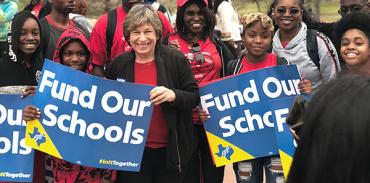Investing in the schools our children deserve
Educators who went on strike this year, from the Hollywood Hills to the hollows of West Virginia, have put down their picket signs, but they are still fighting for the sustainable, long-term investments needed to provide their students the schools they deserve.
The Los Angeles teachers’ strike forced the district to tap into its large reserve to fund lower class sizes; more nurses, librarians and counselors; and a pay raise for teachers. But that was one-time funding, which is why United Teachers Los Angeles and Mayor Eric Garcetti are leading the charge to pass Measure EE, Quality Schools for All. Even frequent adversaries like Eli Broad are helping. The measure will generate $500 million every year for Los Angeles schools, to lower class sizes and hire more psychologists, social workers and other necessary staff. Voter support for this parcel tax measure spiked after the teacher strike, which raised awareness that Los Angeles schools are being starved of the resources students need. But the Chamber of Commerce, anti-taxation extremists and other supporters of Proposition 13, which ushered in this era of education austerity, are pouring resources into defeating Measure EE.
In West Virginia, educators who went on strike twice within a year are still fighting for sufficient funding, with broad public support. “West Virginia’s Voice,” a report released this month by the state’s Department of Education, captured views about public education from more than 20,000 West Virginians. The report shows that residents overwhelmingly favor increasing the number of school social workers, psychologists and counselors; providing funding to strengthen teachers’ skills in shortage areas such as math; and raising pay for school employees. But Republican lawmakers in the state Legislature instead are pushing legislation for charter schools and voucher-like education savings accounts for private and religious school tuition, even though “West Virginia’s Voice” found residents favor existing public schools and oppose school privatization due to concerns about “fraud, lack of accountability and concentration of benefits to higher-income families.”
The forces that have starved, destabilized and preyed on the civic institution that educates 91 percent of American children—our public schools—are fighting us tooth and nail.
Sometimes, inadequate funding for education is the result of a weak economy. But more often, it is a deliberate choice by politicians to cut funds for public schools in order to finance tax cuts for corporations and the superrich, or to siphon off funds for privatization. Twenty-five states spend less on K-12 education than they did before the Great Recession. Schools in these states have been shortchanged by $19 billion. And, while the new majority in the House of Representatives has introduced bills that would boost investments in public schools—for infrastructure, Title I, special education and other vital programs—President Donald Trump and Education Secretary Betsy DeVos have proposed cutting $9 billion from education spending and diverting an additional $5 billion for private school vouchers.
Ideologues like DeVos who favor education markets, competition and “choice” relentlessly push these failed ideologies, despite the abundant evidence of their ineffectiveness. Just this week, the independent research arm of DeVos’ own Department of Education released an evaluation of the Washington, D.C., school voucher program that found it had no impact on either reading or mathematics achievement. DeVos wants to plow funds into failed policies yet pull funding from effective programs that parents value, like after-school programs and other ways to make schools safe and welcoming.
As Frederick Douglass observed, “Power concedes nothing without a demand.” Who is confronting these powerful interests with demands for change? Public school teachers, who made the wrenching decision to walk out for their students, seeing it as their most powerful leverage to secure what they and their students need. Parents and community allies, who value the purpose and potential of public education to develop our children’s full abilities, and the importance of strong public schools in a civilized society. Students, many of whom walked picket lines beside their striking teachers. Who has more at stake in the effort to address the past decade of neglect of our public schools than the young people who depend on them for their very futures?
As the bouquets and balloons showered on teachers during Teacher Appreciation Week celebrations begin to fade, let’s not only keep honoring their dedication to educating and nurturing our young people. Let’s heed the lessons they have taught us during the extraordinary strikes and their ongoing advocacy: Economics lessons (“trickle” is the operative takeaway in trickle-down economics). Civics lessons (collective action is a powerful force for change). And life lessons (there are things worth fighting for, even when change is agonizingly slow and incremental). Let’s heed these lessons by passing Measure EE in Los Angeles and seizing other opportunities to fund our future.

